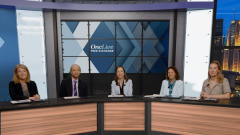
How Does Response to Neoadjuvant Therapy Affect Prognosis and Inform Adjuvant Selection?
Dr Tripathy provides clinical insight on how he assesses HER2+ eBC patient response to neoadjuvant therapy, discusses the typical prognosis for those who do or do not have residual disease, and touches on how he might approach adjuvant treatment selection for each.
Episodes in this series

Transcript:
Sara Hurvitz, MD: We’re going to move on to adjuvant treatment options for HER2 [human epidermal growth factor receptor 2]–positive early breast cancer. Debu, how does patient response to initial neoadjuvant therapy and surgical treatments inform the next steps in the adjuvant treatment selection? Besides pathologic response, which I’m sure you’re going to talk about, are there any other features that can give us an indication of long-term prognosis?
Debu Tripathy, MD: Probably the strongest feature is whether a pathologic response is achieved. That has a big bearing on disease-free outcome and has been proven to be helpful in deciding what adjuvant therapy should be. For patients getting neoadjuvant taxane-based and antibody-based therapy, those with residual disease in the CATHERINE study were randomized to receive T-DM1 [trastuzumab emtansine] or to continue with the trastuzumab or trastuzumab-pertuzumab if that’s what they were receiving. There was a 50% reduction in progression-free events. We’re using T-DM1 [trastuzumab emtansine] in patients with residual disease and antibody alone without. That’s one of the biggest steps forward in which we’ve used this pathologic complete response [pCR] outcomes data.
Sara Hurvitz, MD: Besides pathologic complete response, are there other features that help you choose what to give in the adjuvant setting, or that gives you an idea of how a patient will do? [Maybe] hormone receptor status? At ASCO [American Society of Clinical Oncology Annual Meeting], there was an abstract on looking at a pooled analysis of the presence of tumor-infiltrating lymphocytes associated with prognosis. Do you want to go through some of that and how you use that?
Debu Tripathy, MD: Tumor size and lymph node status are all variables, but we don’t know that they influence treatment. Hormone receptor–positive cancers also have a lower pCR rate. But overall, outcomes are pretty equivalent as long as they get adjuvant endocrine therapy. Tumor-infiltrating lymphocytes [TILs] have been shown to be prognostic of outcome in triple-negative breast cancer and to a smaller extent in hormone receptor–positive [breast cancer]. But a large, pooled analysis of randomized adjuvant trials was conducted that showed that tumor-infiltrating lymphocytes had an important impact on outcomes. In fact, for every 10% decrease in the TIL percentage, there was a 10% improvement in PFS [progression-free survival] outcomes. It predicted not only outcomes but also the benefit of trastuzumab since these were all randomized trials. Patients with high TILs had a 40% lower hazard ratio with trastuzumab. So it’s both prognostic and predictive. How this will be integrated into trials going forward will need to be tested in that context.
Sara Hurvitz, MD: Yes. Heather, are you looking at TILs in your patients as standard of care?
Heather McArthur, MD: Not as standard of care. I’ve noticed that our pathologists are more likely to report on the presence or absence of TILs. So there’s a heightened awareness around the prognostic and predictive impact of TILs, but we’re not doing it formally.
Sara Hurvitz, MD: We’ve seen glimmers of looking at immune-based therapy in HER2+ disease over the years because of this presence of TILs in this subtype of disease, but nothing that’s been practice changing. It will be interesting to see if studies like ASTEFANIA, looking at atezolizumab with T-DM1 [trastuzumab emtansine], ends up being positive or if it’s reliant on the presence or absence of TILs. This is an exciting area, but it’s not something we’re using in our clinical practice.
Transcript edited for clarity.






































